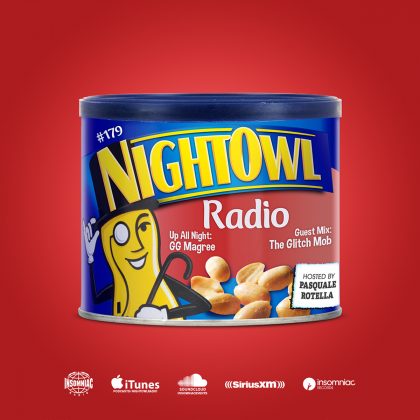edIT’s Debut Album Reissued for 10-Year Anniversary
A gearhead with a blond racing stripe for a haircut, Edward Ma has a living room full of high-end keyboards and digital processors. He’s part of bass-heavy electronic music trio The Glitch Mob, a group whose live setup is powered in part by the most formidable Apple computers on the market. Literally and figuratively, Ma is a guy whose day-to-day has a lot of moving parts; with that comes strategy and decision-making.

But it wasn’t always like this for the now 35-year-old producer and DJ. In the early ’00s, Ma—better known by his artist moniker edIT—was fresh out of the University of Southern California. Holed up in a crummy apartment in South Central, he’d stay up late meticulously hand-editing his way through songs he’d recorded on Pro Tools, while smoking Marlboros and pondering his career prospects and latest romances.
There were no social media strategies to consider back then, no hungry bloggers to feed with fresh music, no pressure to keep the glowsticks waving at the latest festival stop. When it came time to deliver the song titles for his debut album, Crying Over Pros for No Reason, Ma simply took a look around his bedroom and free-associated.
“There’s an ashtray right there. There’s some ants crawling on my desk. There’s a pull-up bar right there,” he recalls thinking. “I literally came up with the track listing in like 10 minutes, just by looking at a bunch of random stuff in my apartment.”
Originally released in 2004 on English indie label Planet Mu, Crying Over Pros was reissued last month to commemorate its 10th anniversary. Slices of glitched-out instrumental hip-hop, the reissue’s 15 tracks—including five bonus ones not released on the original recording—span hip-hop, drum & bass and IDM with plaintive guitar figures and knotty, snipped-up beats.
The album didn’t make much of an impact upon its release; the Planet Mu audience was inclined more toward hard jungle breaks and British artists. But Crying Over Pros offered a hint as to the direction things would go with the rise of Los Angeles’ famous “beat scene,” still in an embryonic state at the time. A decade later, album highlights like “Laundry” and “Mildew” still capture a certain restlessness and longing.
Ma says the album is connected to what he was going through at the time, including “sad romances that I had either lived out, or that I maybe could’ve lived out but never happened.”
Over the years, he realized the record had resonated when people reached out to him on the internet to tell him Crying Over Pros helped them through their own tough times and breakups. He thus decided to reissue it to give something back to fans.
“I still listen to it now; I still think it’s dope,” he says. “Whereas there’s some other music of mine that I’m like, ‘Yeah, that was pretty cool, but I probably won’t really, like, vibe out to this.’”
Ma moved from Boston to L.A. for college, and in the late ‘90s, he got involved with the city’s bass music scene. Building connections with key players like Daddy Kev, who’d go on to start Apha Pup Records and found Low End Theory, Ma landed a spot as a resident DJ at weekly drum & bass/hip-hop club night Konkrete Jungle. But his DJ gigs dried up when the club fell apart.
“Honestly, it was really tough times for me,” Ma says of the years he spent working on the album. “I’d just graduated from college. I had no job. I’d been a DJ up until then, and that’s how I made all my money. And Konkrete Jungle was over. It was like, ‘What the fuck do I do now?’”
 Ma, circa 2004
Ma, circa 2004
With his options limited, he made his way to Monster.com, where he found an opening for a less-than-glamorous position—hawking CDs and DVDs to Chinese-run mom ’n’ pops. The day before his interview, however, he got a call from a company that made advertising music. The owners were referred to Ma by an artist friend of his, and they asked if he could make them a hip-hop demo for a Ford Focus commercial.
There were no social media strategies to consider back then, no hungry bloggers to feed with fresh music, no pressure to keep the glowsticks waving at the latest festival stop.
He ended up landing a job writing jingles for the company. Responsible for churning out music of various genres and styles at a steady clip, he quickly honed his songwriting chops and Pro Tools technique, helping him put push through endless revisions and put the finishing touches on Crying Over Pros.
“Every record… is really like a massive growth spurt for me as a musician and producer,” says Ma. He’s kicking back at his spacious home in the hills of L.A.’s Silver Lake neighborhood—a far cry from his old South Central digs. “Where you start and where you end up, by the time you’re done with those songs, is so drastically different. I’ve learned so much more about myself and what I want to say as a musician.”
Ma worked in the jingle game for six years before cashing out and focusing on The Glitch Mob full time. The trio’s seen big-time success, playing major festivals including EDC and Coachella and seeing their 2014 album Love Death Immortality debut at No. 1 on the Billboard Dance/Electronic Songs chart. As such, Ma hasn’t gone back to the subdued instrumental hip-hop roots of his debut LP. He’s currently got bigger projects going, including The Glitch Mobs’s live show, which features a spectacular Mad Max-style stage setup they call the Blade.
Still, after a decade of significant achievement, the man known as edIT seems nostalgic for his younger days.
“All the reasons to write music these days are so much different than it was back then,” he says, noting that nobody in the pre-Twitter, pre-YouTube era had to think about social media followers or viral marketing strategies. “Back then, nobody was thinking about any of that kind of shit—you know what I mean? It was like, ‘Just make music.’
Follow eDIT on Facebook | Twitter





